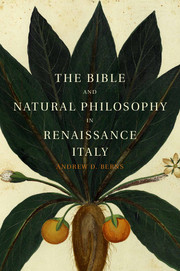Description
The Bible and Natural Philosophy in Renaissance Italy
Jewish and Christian Physicians in Search of Truth
Author: Berns Andrew D.
The Bible and Natural Philosophy in Renaissance Italy explores how doctors studied the Bible and other sacred texts in sixteenth-century Italy.
Language: English
Subject for The Bible and Natural Philosophy in Renaissance Italy:
Approximative price 112.78 €
In Print (Delivery period: 14 days).
Add to cart
Publication date: 11-2014
309 p. · 16x23.5 cm · Hardback
309 p. · 16x23.5 cm · Hardback
Description
/li>Contents
/li>Biography
/li>
The Bible and Natural Philosophy in Renaissance Italy explores the reciprocal relationship between biblical interpretation and natural philosophy in sixteenth-century Italy. The book augments our knowledge of the manifold applications of medical expertise in the Renaissance and of the multiple ways in which the Bible was read by educated people who lacked theological training. Andrew D. Berns demonstrates that many physicians in sixteenth-century Italy, Jewish and Christian alike, took a keen interest in the Bible and post-biblical religious literature. Berns identifies the intellectual tools that Renaissance doctors and natural philosophers brought to bear on their analysis of the Bible and assesses how their education and professional experience helped them acquire, develop, and use those tools. The Bible and Natural Philosophy in Renaissance Italy argues that the changing nature of medical culture in the Renaissance inspired physicians to approach the Bible not only as a divine work but also as a historical and scientific text.
1. 'This is what King David meant': Amatus Lusitanus and Ulisse Aldrovandi on the natural science of scripture; 2. Pliny, papyrus, and the Bible; 3. 'The grandeur of the science of God': David de' Pomi and the stones of the high priest's breastplate; 4. Jewish-Christian relations in late Renaissance Italy: Abraham Portaleone's correspondence with his gentile colleagues; 5. 'I seek the truth from whomever pronounces it': Abraham Portaleone (1542–1612) and ancient Israelite incense.
Andrew D. Berns is Assistant Professor of History at the University of South Carolina.
© 2024 LAVOISIER S.A.S.




